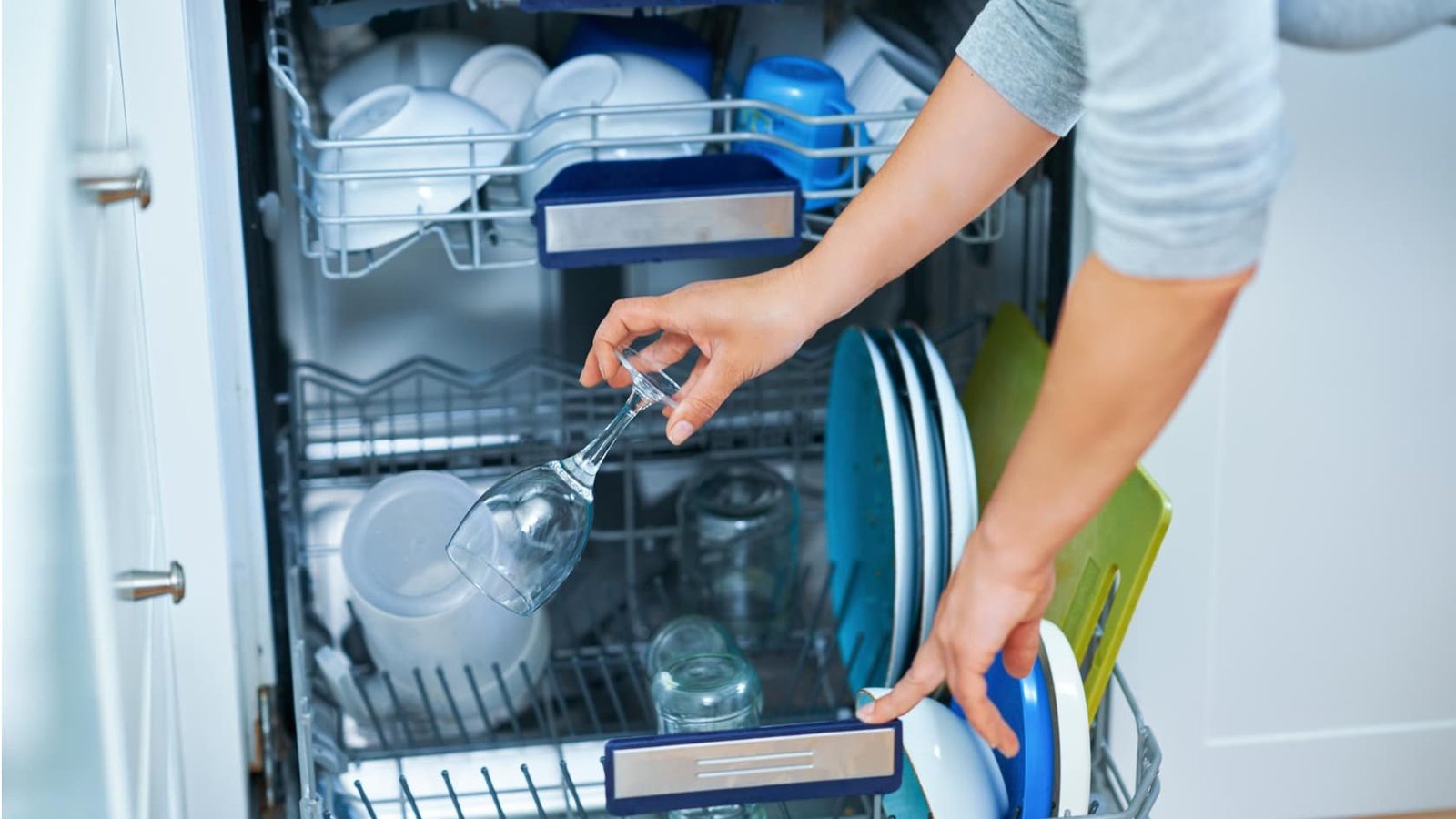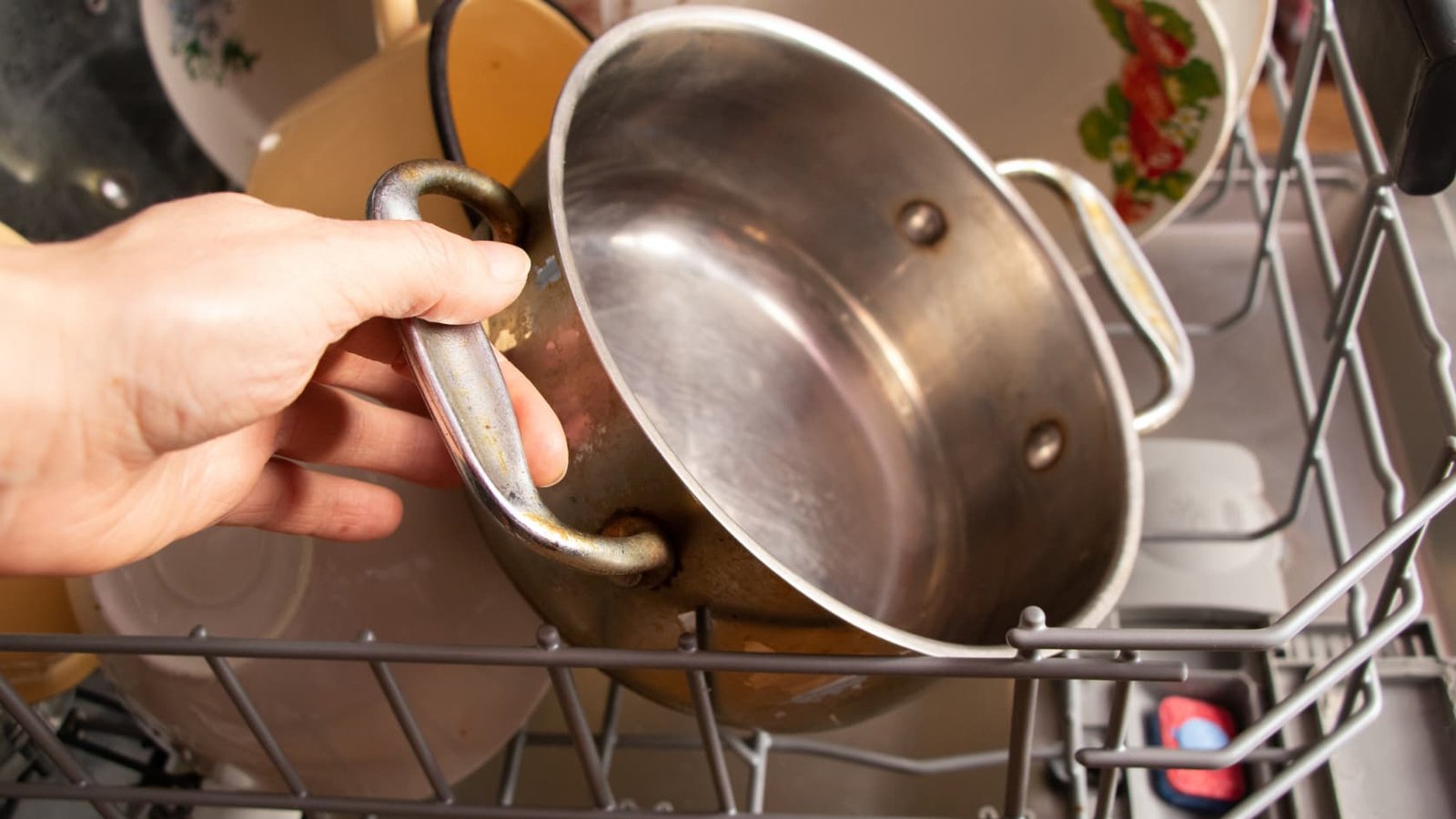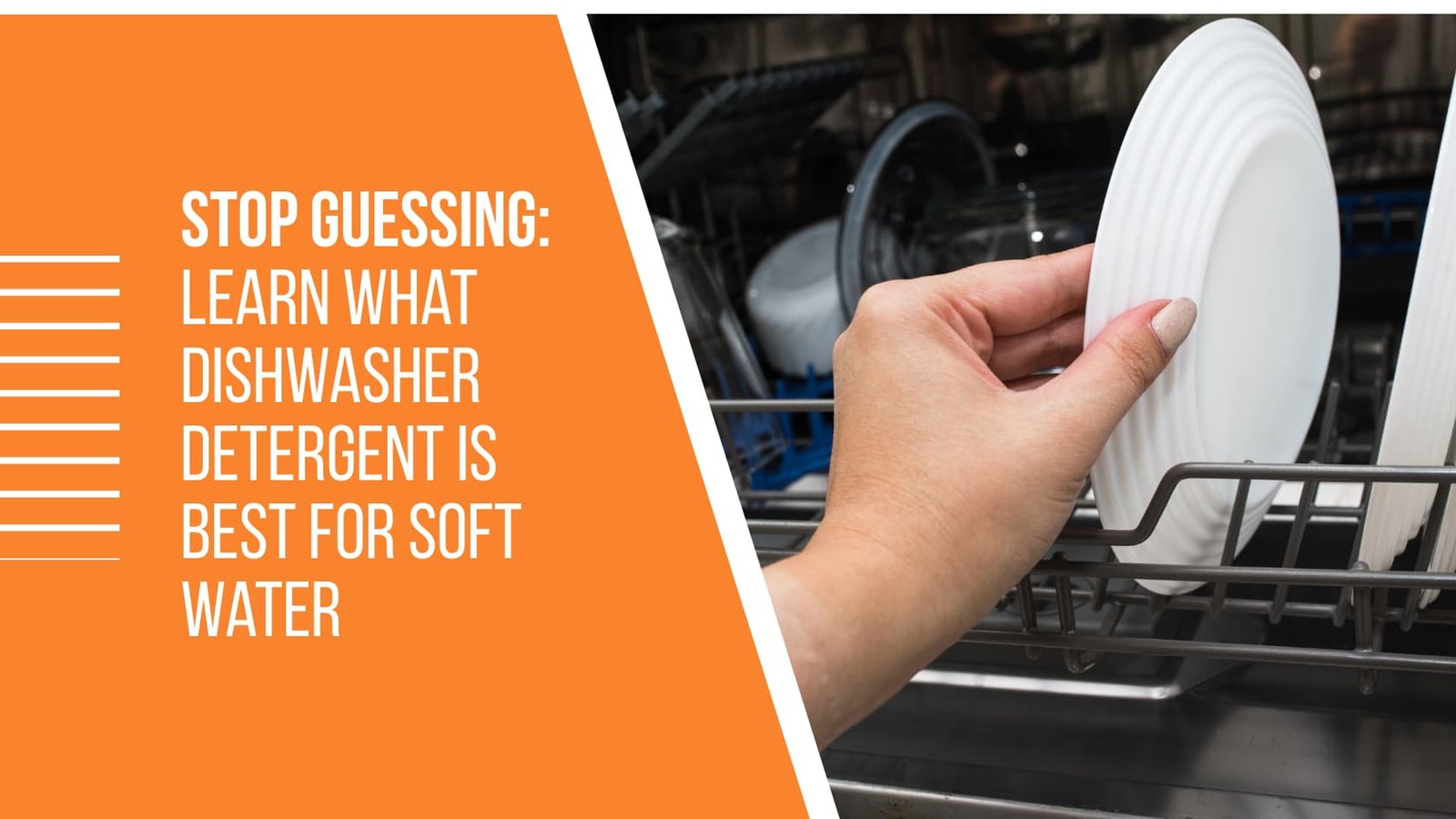Are you tired of dealing with soap residue and spots on your dishes even after running them through the dishwasher?
If you have soft water, the type of dishwasher detergent you use could be the culprit.
Soft water, while great for preventing limescale buildup, can pose challenges when it comes to dishwashing.
In this article, we’ll explore how soft water affects dishwashing and what dishwasher detergent is best for soft water to achieve sparkling clean dishes every time.
Soft water is characterized by its low mineral content, particularly calcium and magnesium.
As a result, it has a different interaction with dishwasher detergents compared to hard water.
This interaction can lead to soap residue and spots on dishes, frustrating homeowners who are left to wonder why their dishwasher isn’t delivering the results they expect.
Understanding this problem and making informed choices about dishwasher detergents can make all the difference in achieving spotless dishes in soft water.
In the following sections, we’ll delve into the factors that influence dishwashing in soft water, explain the causes of soap residue, and provide recommendations for choosing the right dishwasher detergent.
We’ll also explore the role of rinse aids, dos and don’ts of dishwashing in soft water, and tips for preventing etching on glassware.
Say goodbye to the guesswork and frustration, and get ready to master the art of dishwashing in soft water.
Some links in this post are affiliate links, meaning, at no additional cost to you, we may earn a commission if you click through and make a purchase. As an Amazon Associate, I earn from qualifying purchases.
How Does Soft Water Influence Dishwashing?

Soft water dramatically influences dishwashing efficiency.
Its low mineral content enables detergents to operate more effectively as there are fewer minerals to interfere with the cleaning process.
This can, however, lead to practical issues such as over-sudsing.
The reduced need for detergents to combat minerals means you may need to adjust your detergent usage to avoid problems such as excess foam and soap residue on dishes.
What is Soft Water?
Soft water is distinctly characterized by its minimal content of calcium and magnesium.
These minerals, abundant in hard water, are present only in trace amounts in soft water.
The significance of this lies not just in its effects on taste or feel but also in how this water interacts with soaps and detergents.
Due to this lower mineral content, soft water is less likely to lead to build-up in water pipes and appliances, and ensures that cleaning agents are more effective.
How Does Soft Water React with Dishwasher Detergents?
When combined with dishwasher detergents, soft water leads to an accelerated formation of micelles.
These structures are critical to the detergent’s ability to encapsulate and lift away dirt and grease from dishes.
Due to the reduced mineral content, less detergent is required to achieve the desired cleaning results compared to washing with hard water.
Overuse of detergent with soft water often results in too much foaming which might contribute to the inefficiency of the dishwashing process.
This excess detergent causes a film of soap to cover the dishes and the dishwasher’s interior.
Why Adjust Detergent Use in Soft Water?
Adjusting the amount of detergent used in a dishwasher is particularly important in areas with soft water.
The typical dosage, formulated for average or hard water conditions, is simply too much when the water is soft.
This can cause excessive foaming and leave a residue that can dull the appearance of glassware and flatware and potentially degrade dishwasher function over time.
Therefore, it’s crucial you use a reduced amount of detergent to adapt to the specific conditions that soft water presents.
Using the right quantity will help you achieve optimal dish cleanliness without the waste of unnecessary detergents.
Why Does Soap Residue Occur with Soft Water?
The lack of calcium and magnesium ions in soft water allows cleaning agents in soft water to perform too efficiently in some cases.
This increased efficiency can mean that less detergent is needed for cleaning, but often, users do not adjust their detergent use accordingly.
As a result, the detergent can be overused, leading to the formation of micelles that can remain on dishes as a filmy residue if not completely rinsed away.
Are There Other Factors That Contribute to Soap Residue?
The formation of soap residue in soft water isn’t solely due to its low mineral content. Several other factors can heighten the risk of this dishwashing dilemma
Dishwasher Overload: Overloading the dishwasher can restrict water flow and prevent dishes from being rinsed properly, leading to residue.
Improper Detergent Selection: Detergents not specifically formulated for soft water may not rinse away as thoroughly, exacerbating the residue issue.
Incorrect Dishwasher Settings: Choosing settings that don’t match the level of soil on the dishes or the softness of the water can result in a less effective rinse cycle.
Excess Foam: Too much foam is a clear indication of using too much detergent for the softness of the water, which can translate into a residue issue.
Each of these factors, individually or combined, can reinforce the problem of soapy residue when washing dishes in soft water. Hence, it’s important to optimize the dishwashing process.
You need to select the right detergent and the amount to adjust the dishwasher’s settings—to mitigate residue build-up.
Choosing the Right Dishwasher Detergent for Soft Water

When you live in an area with soft water, selecting the right dishwasher detergent isn’t just about finding something that cleans well.
It’s about finding a product that helps avoid soap film and ensures that dishes come out spotless.
The key is to look for detergents with certain characteristics that make them compatible with soft water’s unique properties.
Here’s what you need to keep in mind
Low-Sudsing Formula: A detergent that creates fewer suds is ideal, as soft water doesn’t require much to be effective.
Efficiency in Small Amounts: Detergents that are concentrated and powerful in smaller doses are preferable, as they will be less likely to leave residue.
Minimal Additives: The fewer the additives, the less chance there is for film to form on your dishes.
Soft Water Specific: If available, opt for detergents that are specifically designed for soft water use, as they already factor in the reduced need for soap.
Product Recommendations for Soft Water
Depending on your preferences and the specifics of your dishwasher, you may find one of these products suits your needs.
- Finish Quantum Powerball Pods:
- Powerful cleaning
- Note: Use sparingly to avoid film in soft water
- Cascade Complete Powder:
- Adjustable dosing ideal for soft water
- Economical and effective
- Seventh Generation Free & Clear:
- Eco-friendly liquid detergent
- Gentle and effective without unnecessary additives
If you want a powerful cleaning action, economical usage, or an environmentally friendly option, you can make an informed choice. Remember to be mindful of the quantity used to align with soft water’s efficiency in rinsing away detergents.
The Role of Rinse Aids in Soft Water
Rinse aids are not merely an additional dishwashing accessor. They play a pivotal role in the dish cleaning process, particularly when dealing with soft water.
Their core purpose is to modify the surface tension of the water, which greatly aids in the drying process by allowing water to sheet off dish surfaces instead of forming droplets.
This becomes even more valuable in soft water, which is low in minerals and can leave spots and streaks on dishes after drying.
Due to the inherent nature of soft water’s uniform wetting properties, it may lead to dishes looking somewhat dull once they’re dry, even though the dishes are clean.
This is where rinse aids shine, as they ensure that water disperses evenly and evaporates quickly from the surface of the dishes, mitigating the issue of lingering water spots.
Recommendations for Rinse Aids or Alternatives
When it comes to choosing a rinse aid for soft water, it’s important to consider products that are specifically designed for this condition. Here are some recommendations
Finish Jet-Dry Rinse Aid: Renowned for its superior drying capabilities, particularly good for soft water.
Ecover Rinse Aid: Offers effective spot and residue prevention while being eco-friendly.
Lemi Shine Shine + Dry Rinse: Formulated with citric extracts, it is effective in areas with soft water and leaves dishes shining.
For those who prefer natural alternatives over commercial products, white vinegar serves as an effective DIY rinse aid.
Its acidic nature helps in removing any leftover detergent film without utilizing harsh chemicals.
Simply fill the rinse aid compartment of your dishwasher with white vinegar, and you will notice a significant reduction in water spots and film.
Dos and Don’ts of Dishwashing in Soft Water
Navigating the realm of dishwashing with soft water requires adherence to certain dos and don’ts to ensure sparkling clean results without residue.
While soft water is beneficial for dishwashers, it also calls for tailored practices, from detergent selection to machine settings, to avoid common pitfalls. Here are some best practices you can implement.
Best Practices for Using Dishwasher Detergent in Soft Water
Reduce Detergent Amount: Since soft water enhances the effectiveness of detergent, you should reduce the amount you normally use. This helps in preventing the formation of soap residue, which can cloud your dishes.
Choose the Right Detergent: Look for detergents that are specially formulated for use in soft water environments or those branded as low-sudsing. These products are designed to minimize the residue left behind during the wash cycle.
Regular Maintenance: Keep your dishwasher clean and well-maintained. Regular cleaning of the dishwasher filter and jets ensures that water circulation is at its peak efficiency, which is crucial for washing dishes in soft water.
Common Mistakes to Avoid
Overloading the Dishwasher: An overloaded dishwasher can impede water circulation, which is essential for thorough rinsing. Ensure there’s enough space between dishes for water to flow freely.
Ignoring Water Softness Settings: Many modern dishwashers have adjustable settings for water hardness. Failing to use these settings can lead to suboptimal dishwashing conditions. Refer to your dishwasher’s manual and adjust the settings to suit the softness of your water.
Dealing with Etching and Glassware
Dishwashing in soft water conditions brings its own set of challenges, including the intricate issue of etching on glassware.
This problem should not be confused with soap residue, which is comparably easier to address.
Understanding Soap Residue vs. Etching
Soap residue is that unwelcome filmy layer that often coats the surfaces of your dishes after a wash cycle. It stems from using an excess of detergent which then doesn’t rinse away completely.
Fortunately, this is a temporary annoyance and can typically be remedied with an additional rinse.
Etching, however, is more insidious. This type of damage reflects a sort of glass corrosion, resulting in a cloudy look that no amount of washing can reverse.
The effectiveness of detergents in soft water can inadvertently contribute to overuse, heightening the risk of etching taking hold on your cherished glassware.
Tips for Preventing Etching in Soft Water
To ward off the threat of etching, a delicate balance in detergent use is required. Here are several pointers to safeguard your glassware when washing in soft water.
Moderate Detergent Use: Aim for using enough detergent to clean dishes effectively but not so much that it exceeds what’s necessary and increases etching risk. Find the sweet spot.
Avoid High-Temperature Washes: High temperatures can compound etching’s effects. Lower temperature settings during wash cycles are advisable.
Hand Wash Delicate Glassware: For items that are particularly fragile or hold sentimental value, such as heirloom pieces, opt for gentle hand washing.
Use Protective Racks: Glassware should be secured firmly in the dishwasher using racks designed to prevent movement and abrasion during the cycle.By following these tips and understanding the nuances between soap residue and etching, you can keep your glassware looking immaculate for years to come.
Conclusion
Choosing the ideal dishwasher detergent for soft water is crucial for spot-free and clear dishes.
Since soft water enhances the potency of detergents, a lower quantity might be just as effective, reducing the risk of soap residue and etching. Using rinse aids and proper dishwasher maintenance are also key to exceptional cleaning results.
Here’s a brief list to help you determine the best approach for your dishwashing routine
Experiment: Test various detergents and quantities.
Observe: Look for signs of residue or etching and adjust accordingly.
Enhance: Use rinse aids designed for soft water.
Maintain: Keep your dishwasher in good working order.
Adjust to your soft water environment and embrace the trial-and-error process. With patience and awareness, you can achieve a dazzlingly clean outcome with each cycle.

Pazi Mboh, our Home Efficiency Advocate, is dedicated to promoting sustainable dishwasher use. His tips on energy and water efficiency not only help the environment but also save on your bills, making his guidance invaluable for eco-conscious households.





